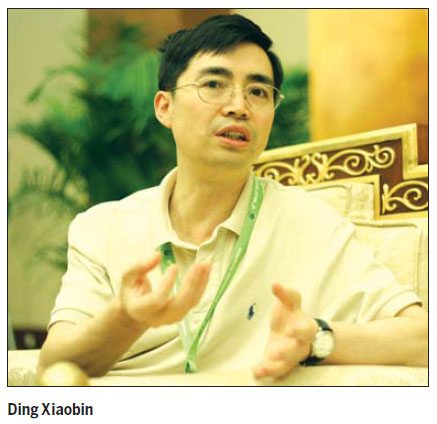SOE to promote technology transfer
Updated: 2012-06-05 08:06
By Wang Xin in Chengdu (China Daily)
|
||||||||

A government-funded company specializing in the commercialization of research results is expected to begin operations in August, according to a senior official of the Chengdu city government.
The 1 billion yuan ($157 million) company is designed to fund promising technological projects and promote cooperation between researchers and investors.
This is one out of a series of initiatives by local authorities to promote technology transfers, said Ding Xiaobin, deputy director of the government's technology bureau.
His remarks came during the World Biomaterials Congress, which is being held in Chengdu, the capital of Southwest China's Sichuan province between June 1 and 5.
With 50 universities and research institutions, more than 10 of which are involved in chemicals research, Chengdu has a vast reservoir of human resources and a strong research capacity, allowing it to develop such high-tech sectors as new materials and biomedicine, Ding said.
Among them is a national engineering technology research center for biomaterials, the only one of its kind in the country. All these factors have enhanced the city's leading position as a research powerhouse in the industry.
The city government plans to increase R&D investment by 2015 to a level of more than 3 percent of local GDP, an increase of 20 percent compared to 2010.
Although the city is advanced in its innovative capabilities, local industry still lags behind.
Of the hundreds of local companies making medicinal or healthcare products, only Kelun Pharmaceutical Co is capable of generating more than 10 billion yuan in annual sales.
"The question of translating advantages in technology into strengths in local industry remains a concern for the city government," Ding said.
In addition to the State-owned technology transfer company, three industry research institutions, respectively dedicated to clean energy, new materials and automobiles, are playing an active role in improving innovation capacity and promoting industrialization with the aid of some private capital firms, he added.
"Industrial growth is surely not only related to the expansion of scale but also to the improvement of quality," Ding emphasized, adding that achieving this goal requires the importation of experts and specialists as well as the development of high-tech sectors.
Authorities are now focusing more on the risks investment project candidates face in terms of intellectual property as well as the level of advancement seen in their key technologies rather than merely investment scale, the officials said.
Quality projects
Such an attitude has brought quality investment projects to the city.
Ding cited Alltech Medical System Co as an example. When company founder Zou Xueming brought his international team to Chengdu in 2005, they had little but the core technological expertise in making nuclear magnetic resonance imaging machines and equipment.
The company generated more than 100 million in annual sales in 2010 alone, an "explosive growth" after three years of almost nonexistent sales, Ding said.
The five-day meeting provides an opportunity to showcase the host city's charm and attract more investors, he said, adding that many of the international executives participating in the event have expressed interest in the investment potential of this southwestern business hub.
Known as a major source of traditional Chinese medicine, Chengdu is home to a number of herbal remedies that have been recognized for their efficacy by the medical profession.
Its biomedicine and medical service sector generated more than 31 billion yuan in revenues last year.
wangxin@chinadaily.com.cn
(China Daily 06/05/2012 page7)

 Relief reaches isolated village
Relief reaches isolated village
 Rainfall poses new threats to quake-hit region
Rainfall poses new threats to quake-hit region
 Funerals begin for Boston bombing victims
Funerals begin for Boston bombing victims
 Quake takeaway from China's Air Force
Quake takeaway from China's Air Force
 Obama celebrates young inventors at science fair
Obama celebrates young inventors at science fair
 Earth Day marked around the world
Earth Day marked around the world
 Volunteer team helping students find sense of normalcy
Volunteer team helping students find sense of normalcy
 Ethnic groups quick to join rescue efforts
Ethnic groups quick to join rescue efforts
Most Viewed
Editor's Picks

|

|

|

|

|

|
Today's Top News
Health new priority for quake zone
Xi meets US top military officer
Japan's boats driven out of Diaoyu
China mulls online shopping legislation
Bird flu death toll rises to 22
Putin appoints new ambassador to China
Japanese ships blocked from Diaoyu Islands
Inspired by Guan, more Chinese pick up golf
US Weekly

|

|






